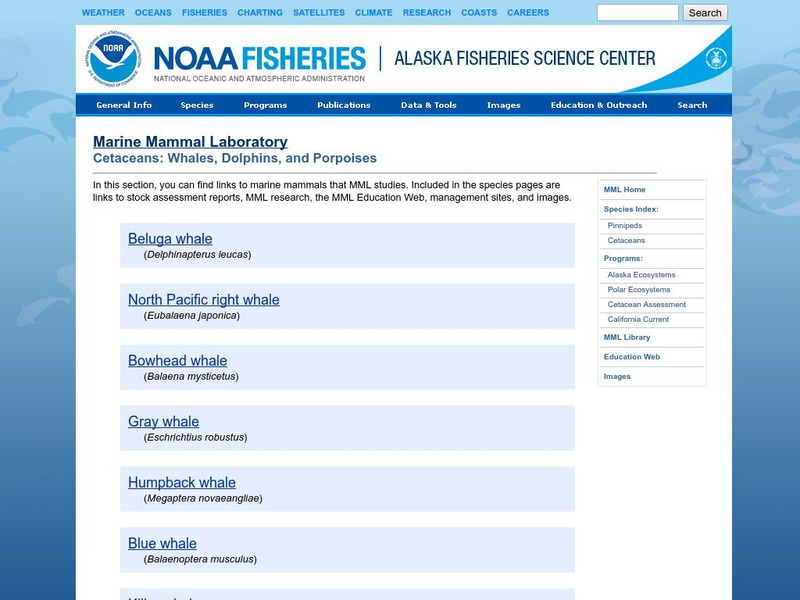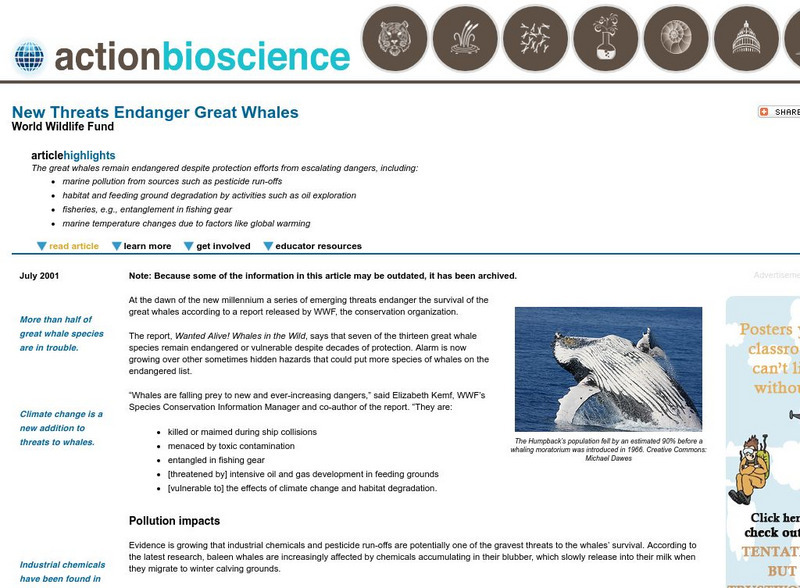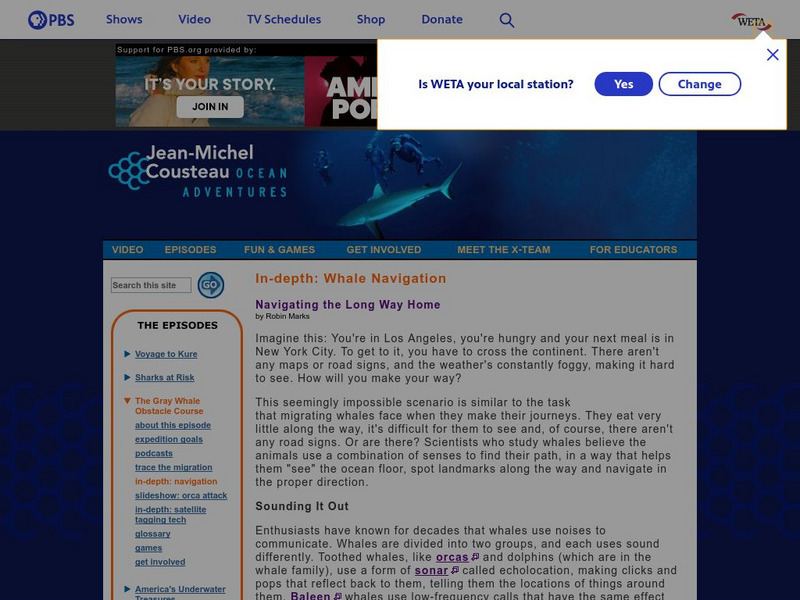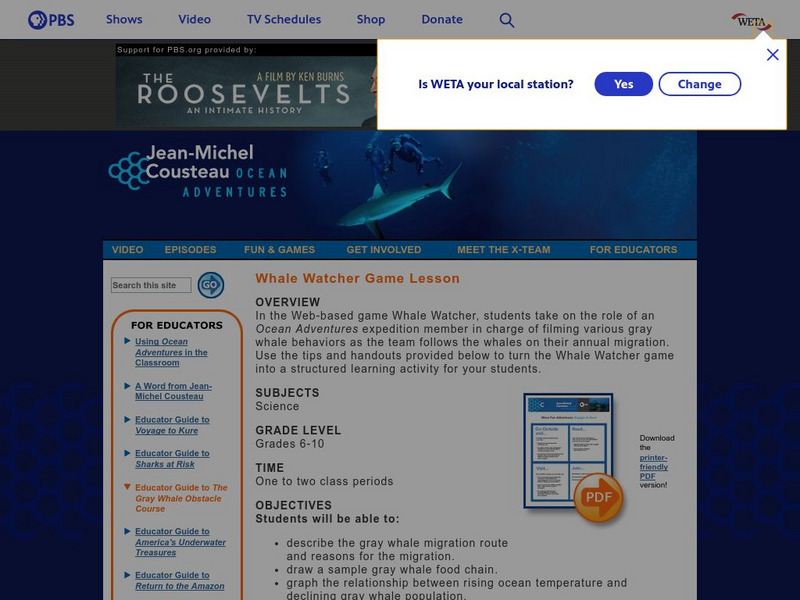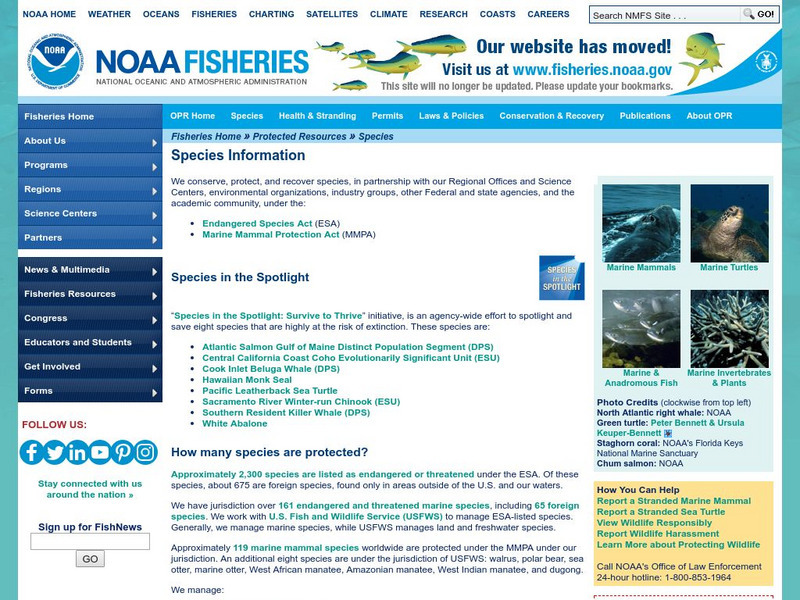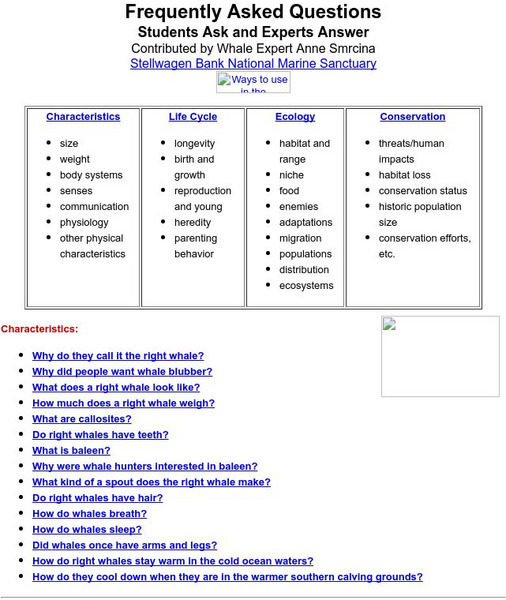Georgia Aquarium
Georgia Aquarium: Common Bottlenose Dolphin
Use this animal guide to learn the scientific name and discover the habitat, diet, reproduction, physical, and other unique characteristics of the Common Bottlenose Dolphin.
San Diego Zoo Global
San Diego Zoo: Whale
This comprehensive resource from the San Diego Zoo presents extensive information on whales including details about their habitat, physical characteristics, size, diet, family life, conservation status, and fun facts. Audio clip provided.
MarineBio Conservation Society
Marine Bio: Humpback Whales
Discover useful information about humpback whales including description, behavior, evolution, communication, range, habitat, diet, mating, and conservation status.
National Center for Ecological Analysis and Synthesis, University of California Santa Barbara
Kids Do Ecology: Marine Mammals
This resource provides information about marine mammals.
NOAA
Noaa: Whales, Dolphins, and Porpoises (Order Cetacea)
Learn about the over 70 species of Cetaceans, or whales, dolphins, and porpoises in the ocean. Read about their behaviors, strandings, and their special sense: echolocation
American Institute of Biological Sciences
Action Bioscience: Fossils and the Origin of Whales
Through fossils scientists have been able to study the evolution of whales. Read this article to take a closer look at the details.
American Institute of Biological Sciences
Action Bioscience: New Threats Endanger Great Whales
An article addressing new worries of the already endangered population of great whales of the world.
TED Talks
Ted: Ted Ed: Why Do Whales Sing?
Stephanie Sardelis decodes the evocative melodies composed by the world's largest mammals, whales. [5:12]
PBS
Jean Michel Cousteau: Ocean Adventures: Whale Navigation
Interesting site explores how whales navigate the waters without a sense of sight. Learn about the noises they use to communicate to migrate.
PBS
Pbs Teachers: Whale Watcher Game Lesson
Describe the gray whale migration route and graph reasons for the migration. Predict what would happen to gray whales if they did not exhibit certain behaviors. This site also contains an interactive game.
PBS
Pbs Teachers: The Great Whales: Make a "Blubber Glove"
Examine the whale's layer of insulating fat, known as blubber, and test the effectiveness of fat as an insulator. Discuss how humans use insulating materials to protect themselves from exposure to cold temperatures.
Other
Whalenet: Home Page
An interacive educational website wich focuses on whales and marine research. There are special links for students, teachers, and the general public. Learn about certain whales, go on a tour, and more.
Other
Whale Net: A Day on a Whale Watch
A great site to use as a complement to a unit on whales. Includes a link to an interactive reading program by Karen Smyth as well a curriculum unit and a whale watch slide show.
Other
Whale Net: Start Up Educational Activities
Site provides resources for teachers seeking to construct an interdisciplinary unit on whales. Includes links to "Whale Watch Data," News Archives, and much more. Provides various activities teachers can integrate into their classrooms...
NOAA
Noaa: Fisheries: Cetaceans: Whales, Dolphins, and Porpoises
Learn more about the marine mammal group of cetaceans. Take a look at their status on the Endangered list and find out what situations put them on that list.
Exploring Nature
Exploring Nature Educational Resource: Oceans of the World
A set of illustrated fact pages, and some activity sheets, on coral reefs, tidal pools, and ocean ecosystems. Find maps, graphic organizers, and a movie link to tidal zones. Hyperlinks to specialized vocabulary words are also provided....
BBC
Bbc: Science and Nature: Animals on the Edge Cetaceans
Get information about the risks faced by the Cetacean mammal group. Additional information is also available on the specific species at risk and actions you can take to help.
Other
Fishin for Facts Library
A comprehensive site that includes a wealth of information on whales, sharks, penguins and squid.
Annenberg Foundation
Annenberg Learner: Journey North: Humpback Whales
A very informative article that answers questions related to characteristics of the humpback whale plus life cycle, ecology, behavioral adaptations and conservation. The migratory patterns of this whale are also tracked.
Annenberg Foundation
Annenberg Learner: Journey North: Right Whales
A comprehensive article that answers a number of questions about the right whale. Questions deal with characteristics, life cycle, ecology and conservation. This site also contains lessons and activities that can be used in the...
Smithsonian Institution
Smithsonian National Zoo: Zoogoer Magazine: Killer Cultures
This article covers a variety of topics related to Killer Whales including Killers on the Move, A Tale of Two Tribes, Deciphered Dialects, Eyes on the Genes, and more.
Animal Fact Guide
Animal Fact Guide: Narwhal Whales
Read facts about the narwhal including information on its physical characteristics, habitat (with a distribution map), diet, breeding patterns, unique traits and behavior, conservation status, and tips on what you can do to help.
Other
Encounters: Wild Explorer: Humpback Whale
Scroll down to Humpback Whale for resources for "Sights and Sounds" and "The Show-Off Cetacean". Anthropologist, Richard Nelson, uncovers fascinating facts about the humpback whale as the viewer listens to their sounds and watches a...


